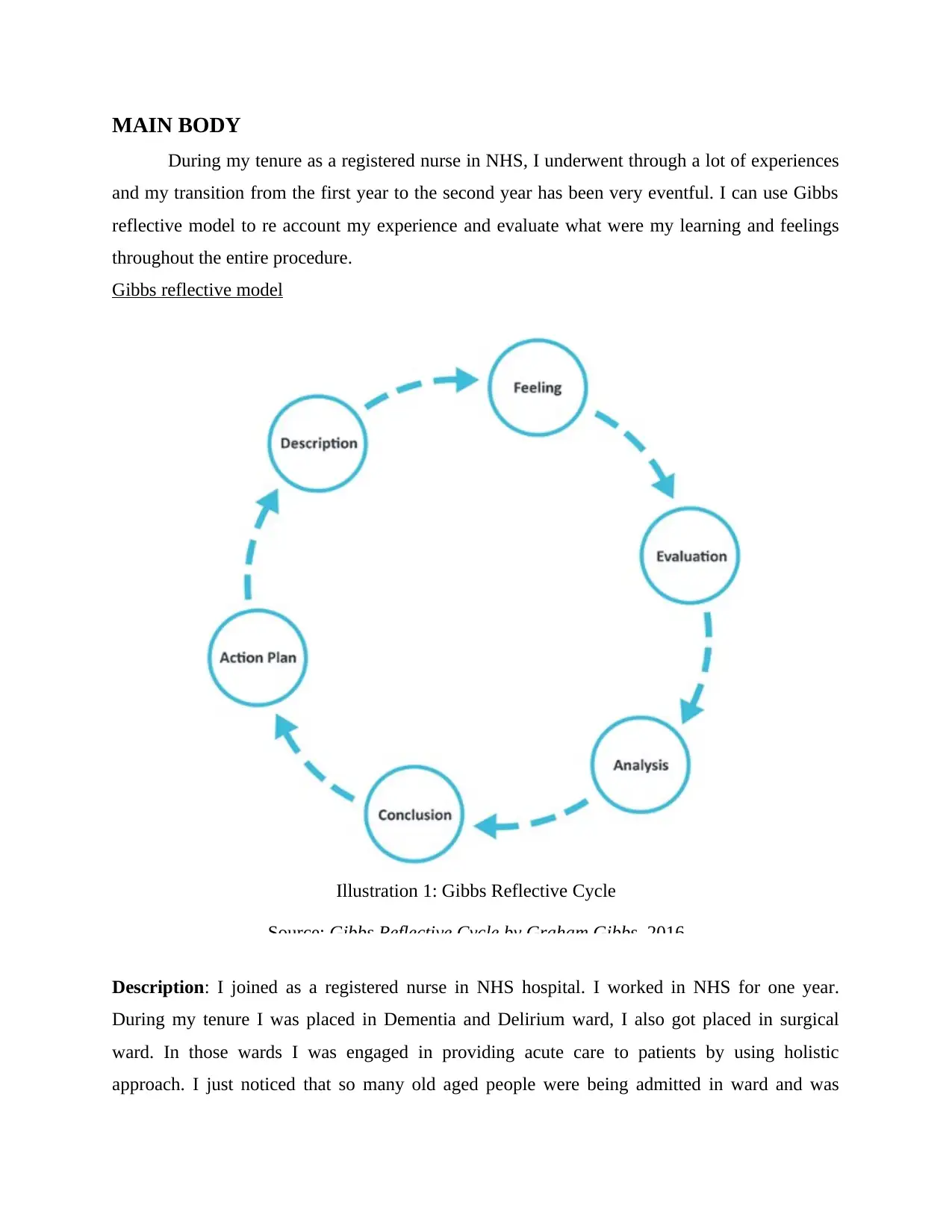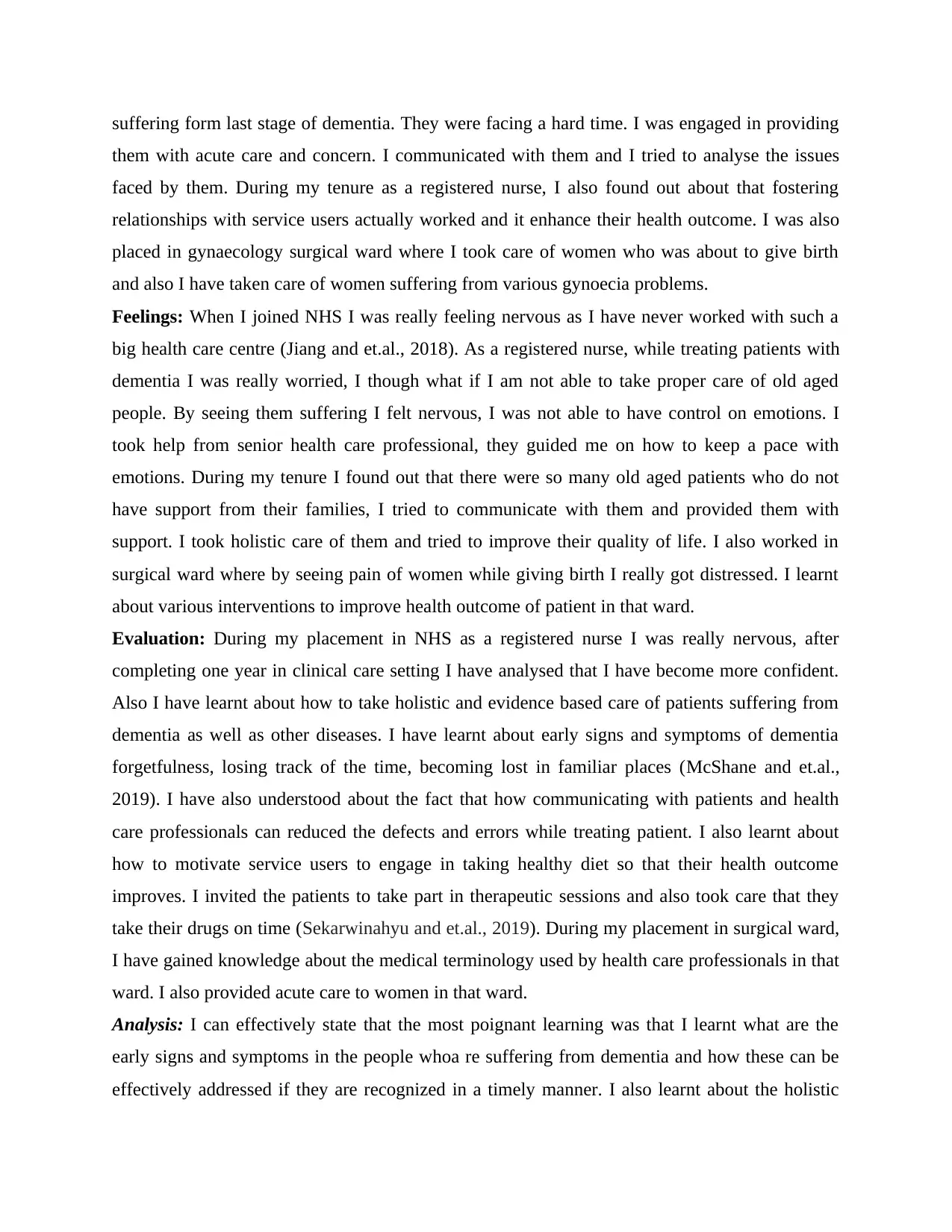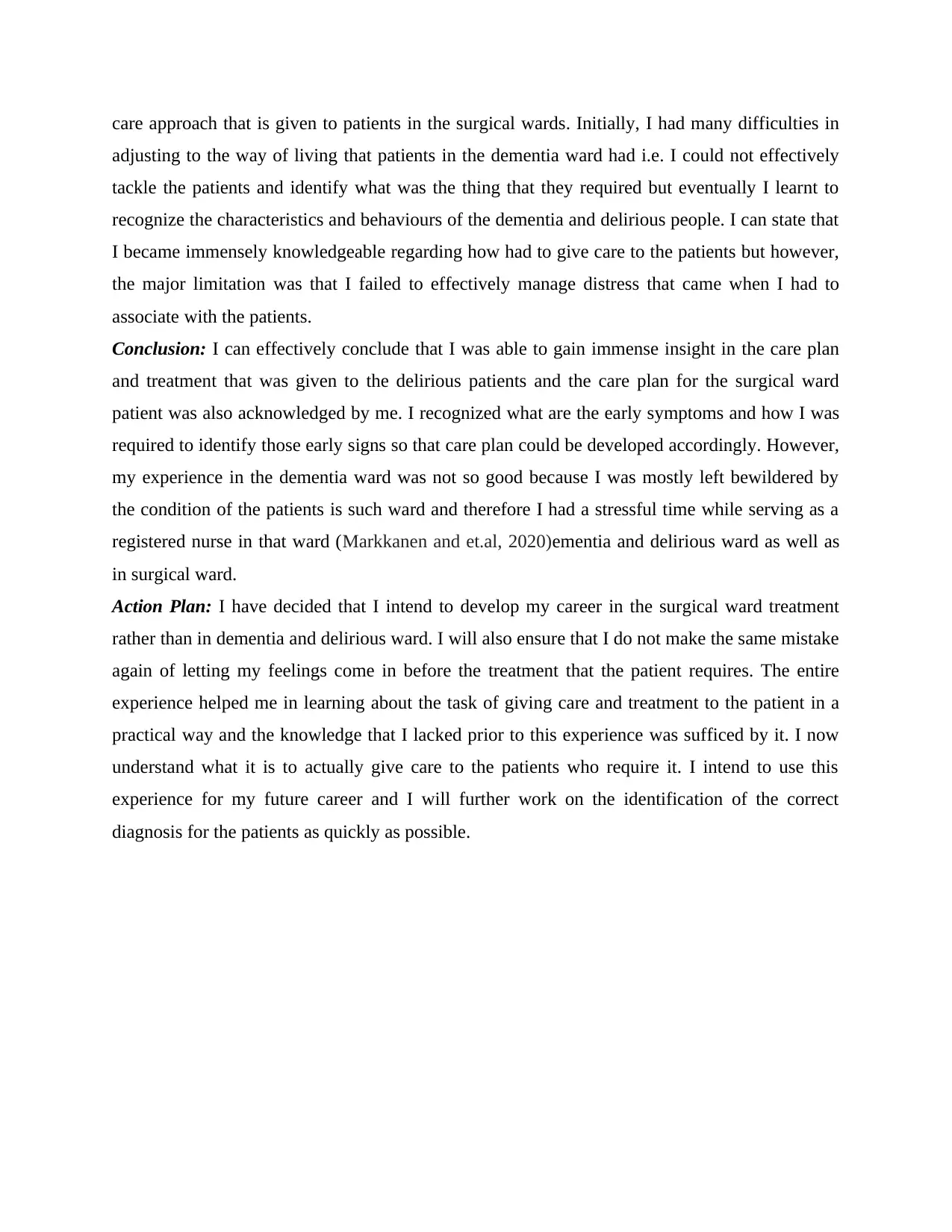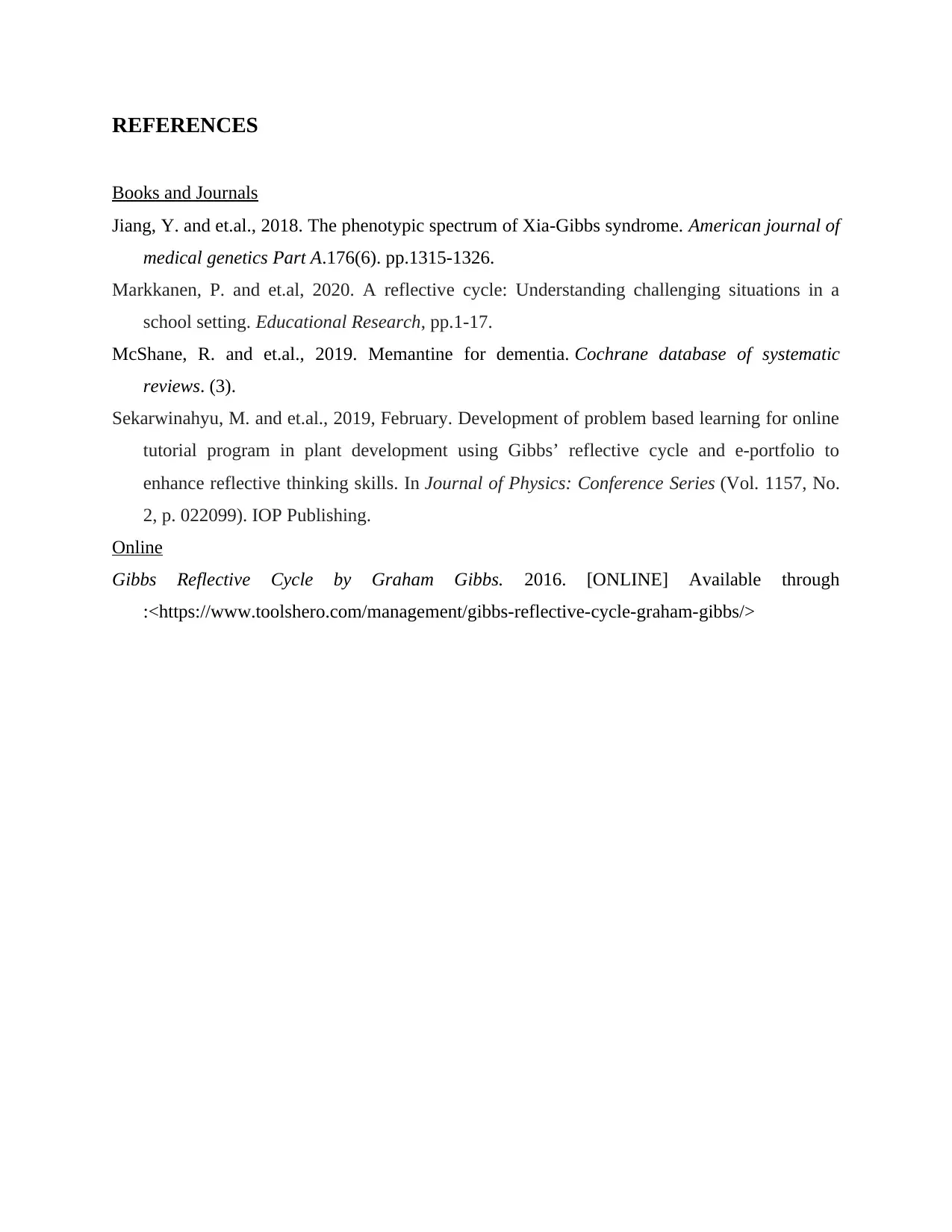Gibbs Circle Reflective Essay: Nursing Experience in NHS Hospital
VerifiedAdded on 2023/01/13
|7
|1247
|44
Essay
AI Summary
This reflective essay utilizes the Gibbs reflective cycle to analyze a registered nurse's experiences within the NHS, specifically focusing on placements in dementia and surgical wards. The essay details the nurse's initial feelings of nervousness, the challenges faced in providing holistic care to patients, and the learning gained from these experiences. The evaluation highlights the development of confidence, the understanding of early dementia symptoms, and the importance of communication. The analysis emphasizes the recognition of early dementia signs and the limitations in managing emotional distress. The conclusion reflects on the insights gained in patient care and the intention to specialize in surgical ward treatment. The essay also includes an action plan for future career development.

GIBBS CIRCLE
REFLECTIVE
ESSAY
REFLECTIVE
ESSAY
Paraphrase This Document
Need a fresh take? Get an instant paraphrase of this document with our AI Paraphraser

Table of Contents
MAIN BODY...................................................................................................................................3
Gibbs reflective model................................................................................................................3
REFERENCES................................................................................................................................6
MAIN BODY...................................................................................................................................3
Gibbs reflective model................................................................................................................3
REFERENCES................................................................................................................................6

MAIN BODY
During my tenure as a registered nurse in NHS, I underwent through a lot of experiences
and my transition from the first year to the second year has been very eventful. I can use Gibbs
reflective model to re account my experience and evaluate what were my learning and feelings
throughout the entire procedure.
Gibbs reflective model
Description: I joined as a registered nurse in NHS hospital. I worked in NHS for one year.
During my tenure I was placed in Dementia and Delirium ward, I also got placed in surgical
ward. In those wards I was engaged in providing acute care to patients by using holistic
approach. I just noticed that so many old aged people were being admitted in ward and was
Illustration 1: Gibbs Reflective Cycle
Source: Gibbs Reflective Cycle by Graham Gibbs, 2016
During my tenure as a registered nurse in NHS, I underwent through a lot of experiences
and my transition from the first year to the second year has been very eventful. I can use Gibbs
reflective model to re account my experience and evaluate what were my learning and feelings
throughout the entire procedure.
Gibbs reflective model
Description: I joined as a registered nurse in NHS hospital. I worked in NHS for one year.
During my tenure I was placed in Dementia and Delirium ward, I also got placed in surgical
ward. In those wards I was engaged in providing acute care to patients by using holistic
approach. I just noticed that so many old aged people were being admitted in ward and was
Illustration 1: Gibbs Reflective Cycle
Source: Gibbs Reflective Cycle by Graham Gibbs, 2016
⊘ This is a preview!⊘
Do you want full access?
Subscribe today to unlock all pages.

Trusted by 1+ million students worldwide

suffering form last stage of dementia. They were facing a hard time. I was engaged in providing
them with acute care and concern. I communicated with them and I tried to analyse the issues
faced by them. During my tenure as a registered nurse, I also found out about that fostering
relationships with service users actually worked and it enhance their health outcome. I was also
placed in gynaecology surgical ward where I took care of women who was about to give birth
and also I have taken care of women suffering from various gynoecia problems.
Feelings: When I joined NHS I was really feeling nervous as I have never worked with such a
big health care centre (Jiang and et.al., 2018). As a registered nurse, while treating patients with
dementia I was really worried, I though what if I am not able to take proper care of old aged
people. By seeing them suffering I felt nervous, I was not able to have control on emotions. I
took help from senior health care professional, they guided me on how to keep a pace with
emotions. During my tenure I found out that there were so many old aged patients who do not
have support from their families, I tried to communicate with them and provided them with
support. I took holistic care of them and tried to improve their quality of life. I also worked in
surgical ward where by seeing pain of women while giving birth I really got distressed. I learnt
about various interventions to improve health outcome of patient in that ward.
Evaluation: During my placement in NHS as a registered nurse I was really nervous, after
completing one year in clinical care setting I have analysed that I have become more confident.
Also I have learnt about how to take holistic and evidence based care of patients suffering from
dementia as well as other diseases. I have learnt about early signs and symptoms of dementia
forgetfulness, losing track of the time, becoming lost in familiar places (McShane and et.al.,
2019). I have also understood about the fact that how communicating with patients and health
care professionals can reduced the defects and errors while treating patient. I also learnt about
how to motivate service users to engage in taking healthy diet so that their health outcome
improves. I invited the patients to take part in therapeutic sessions and also took care that they
take their drugs on time (Sekarwinahyu and et.al., 2019). During my placement in surgical ward,
I have gained knowledge about the medical terminology used by health care professionals in that
ward. I also provided acute care to women in that ward.
Analysis: I can effectively state that the most poignant learning was that I learnt what are the
early signs and symptoms in the people whoa re suffering from dementia and how these can be
effectively addressed if they are recognized in a timely manner. I also learnt about the holistic
them with acute care and concern. I communicated with them and I tried to analyse the issues
faced by them. During my tenure as a registered nurse, I also found out about that fostering
relationships with service users actually worked and it enhance their health outcome. I was also
placed in gynaecology surgical ward where I took care of women who was about to give birth
and also I have taken care of women suffering from various gynoecia problems.
Feelings: When I joined NHS I was really feeling nervous as I have never worked with such a
big health care centre (Jiang and et.al., 2018). As a registered nurse, while treating patients with
dementia I was really worried, I though what if I am not able to take proper care of old aged
people. By seeing them suffering I felt nervous, I was not able to have control on emotions. I
took help from senior health care professional, they guided me on how to keep a pace with
emotions. During my tenure I found out that there were so many old aged patients who do not
have support from their families, I tried to communicate with them and provided them with
support. I took holistic care of them and tried to improve their quality of life. I also worked in
surgical ward where by seeing pain of women while giving birth I really got distressed. I learnt
about various interventions to improve health outcome of patient in that ward.
Evaluation: During my placement in NHS as a registered nurse I was really nervous, after
completing one year in clinical care setting I have analysed that I have become more confident.
Also I have learnt about how to take holistic and evidence based care of patients suffering from
dementia as well as other diseases. I have learnt about early signs and symptoms of dementia
forgetfulness, losing track of the time, becoming lost in familiar places (McShane and et.al.,
2019). I have also understood about the fact that how communicating with patients and health
care professionals can reduced the defects and errors while treating patient. I also learnt about
how to motivate service users to engage in taking healthy diet so that their health outcome
improves. I invited the patients to take part in therapeutic sessions and also took care that they
take their drugs on time (Sekarwinahyu and et.al., 2019). During my placement in surgical ward,
I have gained knowledge about the medical terminology used by health care professionals in that
ward. I also provided acute care to women in that ward.
Analysis: I can effectively state that the most poignant learning was that I learnt what are the
early signs and symptoms in the people whoa re suffering from dementia and how these can be
effectively addressed if they are recognized in a timely manner. I also learnt about the holistic
Paraphrase This Document
Need a fresh take? Get an instant paraphrase of this document with our AI Paraphraser

care approach that is given to patients in the surgical wards. Initially, I had many difficulties in
adjusting to the way of living that patients in the dementia ward had i.e. I could not effectively
tackle the patients and identify what was the thing that they required but eventually I learnt to
recognize the characteristics and behaviours of the dementia and delirious people. I can state that
I became immensely knowledgeable regarding how had to give care to the patients but however,
the major limitation was that I failed to effectively manage distress that came when I had to
associate with the patients.
Conclusion: I can effectively conclude that I was able to gain immense insight in the care plan
and treatment that was given to the delirious patients and the care plan for the surgical ward
patient was also acknowledged by me. I recognized what are the early symptoms and how I was
required to identify those early signs so that care plan could be developed accordingly. However,
my experience in the dementia ward was not so good because I was mostly left bewildered by
the condition of the patients is such ward and therefore I had a stressful time while serving as a
registered nurse in that ward (Markkanen and et.al, 2020)ementia and delirious ward as well as
in surgical ward.
Action Plan: I have decided that I intend to develop my career in the surgical ward treatment
rather than in dementia and delirious ward. I will also ensure that I do not make the same mistake
again of letting my feelings come in before the treatment that the patient requires. The entire
experience helped me in learning about the task of giving care and treatment to the patient in a
practical way and the knowledge that I lacked prior to this experience was sufficed by it. I now
understand what it is to actually give care to the patients who require it. I intend to use this
experience for my future career and I will further work on the identification of the correct
diagnosis for the patients as quickly as possible.
adjusting to the way of living that patients in the dementia ward had i.e. I could not effectively
tackle the patients and identify what was the thing that they required but eventually I learnt to
recognize the characteristics and behaviours of the dementia and delirious people. I can state that
I became immensely knowledgeable regarding how had to give care to the patients but however,
the major limitation was that I failed to effectively manage distress that came when I had to
associate with the patients.
Conclusion: I can effectively conclude that I was able to gain immense insight in the care plan
and treatment that was given to the delirious patients and the care plan for the surgical ward
patient was also acknowledged by me. I recognized what are the early symptoms and how I was
required to identify those early signs so that care plan could be developed accordingly. However,
my experience in the dementia ward was not so good because I was mostly left bewildered by
the condition of the patients is such ward and therefore I had a stressful time while serving as a
registered nurse in that ward (Markkanen and et.al, 2020)ementia and delirious ward as well as
in surgical ward.
Action Plan: I have decided that I intend to develop my career in the surgical ward treatment
rather than in dementia and delirious ward. I will also ensure that I do not make the same mistake
again of letting my feelings come in before the treatment that the patient requires. The entire
experience helped me in learning about the task of giving care and treatment to the patient in a
practical way and the knowledge that I lacked prior to this experience was sufficed by it. I now
understand what it is to actually give care to the patients who require it. I intend to use this
experience for my future career and I will further work on the identification of the correct
diagnosis for the patients as quickly as possible.

REFERENCES
Books and Journals
Jiang, Y. and et.al., 2018. The phenotypic spectrum of Xia‐Gibbs syndrome. American journal of
medical genetics Part A.176(6). pp.1315-1326.
Markkanen, P. and et.al, 2020. A reflective cycle: Understanding challenging situations in a
school setting. Educational Research, pp.1-17.
McShane, R. and et.al., 2019. Memantine for dementia. Cochrane database of systematic
reviews. (3).
Sekarwinahyu, M. and et.al., 2019, February. Development of problem based learning for online
tutorial program in plant development using Gibbs’ reflective cycle and e-portfolio to
enhance reflective thinking skills. In Journal of Physics: Conference Series (Vol. 1157, No.
2, p. 022099). IOP Publishing.
Online
Gibbs Reflective Cycle by Graham Gibbs. 2016. [ONLINE] Available through
:<https://www.toolshero.com/management/gibbs-reflective-cycle-graham-gibbs/>
Books and Journals
Jiang, Y. and et.al., 2018. The phenotypic spectrum of Xia‐Gibbs syndrome. American journal of
medical genetics Part A.176(6). pp.1315-1326.
Markkanen, P. and et.al, 2020. A reflective cycle: Understanding challenging situations in a
school setting. Educational Research, pp.1-17.
McShane, R. and et.al., 2019. Memantine for dementia. Cochrane database of systematic
reviews. (3).
Sekarwinahyu, M. and et.al., 2019, February. Development of problem based learning for online
tutorial program in plant development using Gibbs’ reflective cycle and e-portfolio to
enhance reflective thinking skills. In Journal of Physics: Conference Series (Vol. 1157, No.
2, p. 022099). IOP Publishing.
Online
Gibbs Reflective Cycle by Graham Gibbs. 2016. [ONLINE] Available through
:<https://www.toolshero.com/management/gibbs-reflective-cycle-graham-gibbs/>
⊘ This is a preview!⊘
Do you want full access?
Subscribe today to unlock all pages.

Trusted by 1+ million students worldwide

1
1 out of 7
Related Documents
Your All-in-One AI-Powered Toolkit for Academic Success.
+13062052269
info@desklib.com
Available 24*7 on WhatsApp / Email
![[object Object]](/_next/static/media/star-bottom.7253800d.svg)
Unlock your academic potential
Copyright © 2020–2026 A2Z Services. All Rights Reserved. Developed and managed by ZUCOL.




